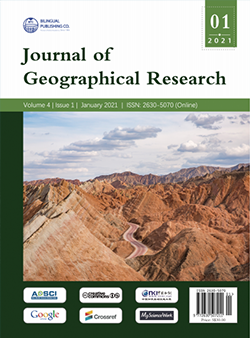-
1462
-
292
-
285
-
258
-
256
Implication of Household’s Income Composition on Infrastructure Maintenance in Residential Core of Akure, Nigeria
DOI:
https://doi.org/10.30564/jgr.v4i1.2576Abstract
This study examines the implication of household income composition on infrastructure maintenance in the residential core of Akure, Nigeria with a view to providing suggestive recommendations that will remedy identified problems in the research locale. With regards to this, an estimated of 1% research population, amounting to 425, were served with questionnaires using systematic random sampling technique with replacement. Findings revealed that residents in the study area are low income earners with larger population influenced by market proximity, low prices of staple food items and affordable but tumbledown housing. Likewise, essential facilities are in poor state owing to poor maintenance. Besides, household income induced variables considered in the study, which accounted for 75.6% of the challenges limiting routine facilities maintenance in the study area. The study recommends skill acquisition training, resource collaborative efforts and soft loans scheme to boost the income generation of residents in this locale.
Keywords:
Household income; Infrastructure maintenance; Concession; Residential core; AkureReferences
[1] Canberra Group Handbook. Canberra Group Handbook on Household Income Statistics. 2nd Edition,United Nations, 2011. Retrieved from https://www.unece.org/fileadmin/DAM/stats/groups/cgh/CanberaHandbook2011WEeB.pdf
[2] World Bank. From Oil to Cities: Nigeria’s Next Transformation, 2016. Retrieved from:https://documents.worldbank.org/curated/en/711661468010811972/pdf/106150-PUB-ADDDOI-ISBN-ERIES-OUO-9.pdf
[3] Ogunbajo, R.A., Bello, M.O., Adebayo, M.A. Assessment of Urban Infrastructure Quality and User Satisfaction in Low Income Residential Neighbourhood in Minna, Nigeria. ATBU Journal of Environmental Technology, 2012, 9(1): 98-115.
[4] Onah, R., Innocent, E.O., Andrew, O. Addressing the Challenges to Optimization of Public-Private Partnership for Infrastructure Development in Nigeria.Science Arena Publications Specialty Journal of Politics and Law, 2017, 2(2):14-24
[5] Owhor, S.C., Ojo, V.K., Nkpurukwe, O.I., Abdul,A.I.G. Public-Private Partnership (PPP) as Catalyst for Sustainable Infrastructural Development (Effort of Rivers, Cross Rivers, Oyo and Lagos State Governments). International Journal of Engineering Science Invention, 2015, 4(2):53-69.
[6] Yoade, A.O. Housing preference of residents in IleIfe, Nigeria. Economic and Environmental Studies (E&ES), 2016, 16(3): 435-452.
[7] Asoka, G.W.N., Thuo, A.D.M., Bunyasi, M. M. Effects of Population Growth on Urban Infrastructure and Services: A Case of Eastleigh Neighborhood Nairobi, Kenya. Journal of nthropology and Archaeology, 2013, 1(1): 41-56.
[8] UN-Habitat. Infrastructure for Economic Development and Poverty Reduction in Africa, 2011. Retrieved from: https://www.zaragoza.es/contenidos/medioambiente/onu/537-eng.pdf
[9] Arimah, B. Infrastructure as a Catalyst for the Prosperity of African Cities. Urban Transitions Conference, Shanghai, September. Procedia Engineering,2016, 198: 245-266.
[10] Okeyinka, Y.R. Socio–Economic Characteristics of Residents of Multi-Habited Houses in Ogbomoso,South West, Nigeria. Global Journal of Human-Social Science: Sociology and Culture, 2016, 16(6):75-82.
[11] National Planning Commission (NPC, 2015).National Integrated Infrastructure Master Plan,2015. Federal Republic of Nigeria. Retrieved from https://nesgroup.org/storage/app/public/policies/National-Intergrated-InfractructureMaster-Plan-2015-2043compressed1562697068.pdf
[12] Nwosu, A.E. Assessment of the Effect of Urban Infrastructure as a tool for enhancing the Values of Residential Property in Akure. Ethiopian Journal of Environmental Studies and Management,2015, 8(2):196-205. Retrieved from: https://dx.doi.org/10.4314/ejesm.v8i2.9
[13] Olotuah, A.O., Olotuah, A.A., Olotuah, A.M. Appraising strategies for housing provision for low-income government workers in Ado-Ekiti, Nigeria.International Journal of Engineering Sciences and Research Technology, 2018, 7(10):123-131
[14] Aluko, O. Impact of poverty on housing condition in Nigeria: A case study of Mushin Local Government Area of Lagos State. Journal of African Studies and Development, 2012, 4(3):81-89. https://10.5897/JASD11.047
[15] Brook, P., Smith, W. Improving access to infrastructure services by the poor: Institutional and policy responses, 2001. World Bank. Retrieved from:https://web.mit.edu/urbanupgrading/waterandsanitation/resources/pdf-files/BrookImprovingAccess.pdf
[16] Makinde, O., Bjorkqvist, K., Osterman, K. Overcrowding as a risk factor for domestic violence and anti-social behaviour among adolescents in Ejigbo,Lagos, Nigeria. Global Mental Health, 2016, 3(16):1-9. https://10.1017/gmh.2016.10
[17] Bankole, E.T., Oke, O.M. Effects of Housing Quality and Overcrowding on Psychological Wellbeing of Residents in Lagos State, Nigeria. IOSR Journal of Humanities and Social Science, 2016, 21(11):14-22.DOI: https://10.9790/0837-2111091422
[18] Muhammad, M.S., Kasim, R., Martin, D., Mohammed, M.J., Adamu, D. Housing Quality in Segregated Residential Neighborhoods in Bauchi Metropolis.International Journal of Scientific and Research Publications, 2015, 5(11):432-439
[19] Akinbamijo, O.A. Beloved, we are Debtors: A Treatise on Environmental Management. Inaugural Lecture Series 115, Federal University of Technology Akure, Nigeria, 2019.
[20] Oguntimehin, A.B., and Bamidele, E.O. Upgrading the Old Traditional Neighbourhood in Nigerian Cities: A Case Study of Oke-Itoku Area of Abeokuta.IOSR Journal of Environmental Science, Toxicology and Food Technology, 2017, 11(5,2):24-30.
[21] Gambo, Y.L., Idowu, O.B., Anyakora, I.M. Impact of Poor Housing Condition on the Economy of the UrbanPoor: Makoko, Lagos State in View. Journal of Emerging Trends in Economics and Management Sciences (JETEMS), 2012, 3(4):302-307
[22] Olasemojo, R.O., Owoeye, J.O. Chronicle of exogenous factors influencing maintenance in residential core of Akure, Nigeria. Sustainable Development Research, 2020, 2(1):26-34. Ideas Spread Publications,New York. Retrieved from:https://www.ideasspread.org/index.php/sdr/issue/view/45
[23] Owoeye, J.O. A study on environmental habitability of core residential neighborhood in Akure, Nigeria.American Journal of Research Communication,2013, 1(2):140-153.
[24] Rotowa, O.O., Olujimi, J.A.B., Omole, F.K., Olajuyigbe, A.E. Socio-economic Factors Affecting Households Sanitation Preferences in Akure, Nigeria.European International Journal of Science and Technology, 2015, 4(5):183-194.
[25] Ondo State Bureau of Statistics (ODSBS, 2012). Report of Integrated Household Survey in Ondo State,2011 (World Bank Project); Printed under the auspices of NSDP/SRF, 2012.
[26] Macheve, B., Danilenko, A., Abdullah, R., Bove, A.,Moffitt, J.L. State Water Agencies in Nigeria: A Performance Assessment. The World Bank, 2015.DOI: https://dx.doi.org/10.1596/978-1-4648-0657-5
Downloads
How to Cite
Issue
Article Type
License
Copyright © 2021 Owoeye J. O.

This is an open access article under the Creative Commons Attribution-NonCommercial 4.0 International (CC BY-NC 4.0) License.




 Owoeye J. O.
Owoeye J. O.





